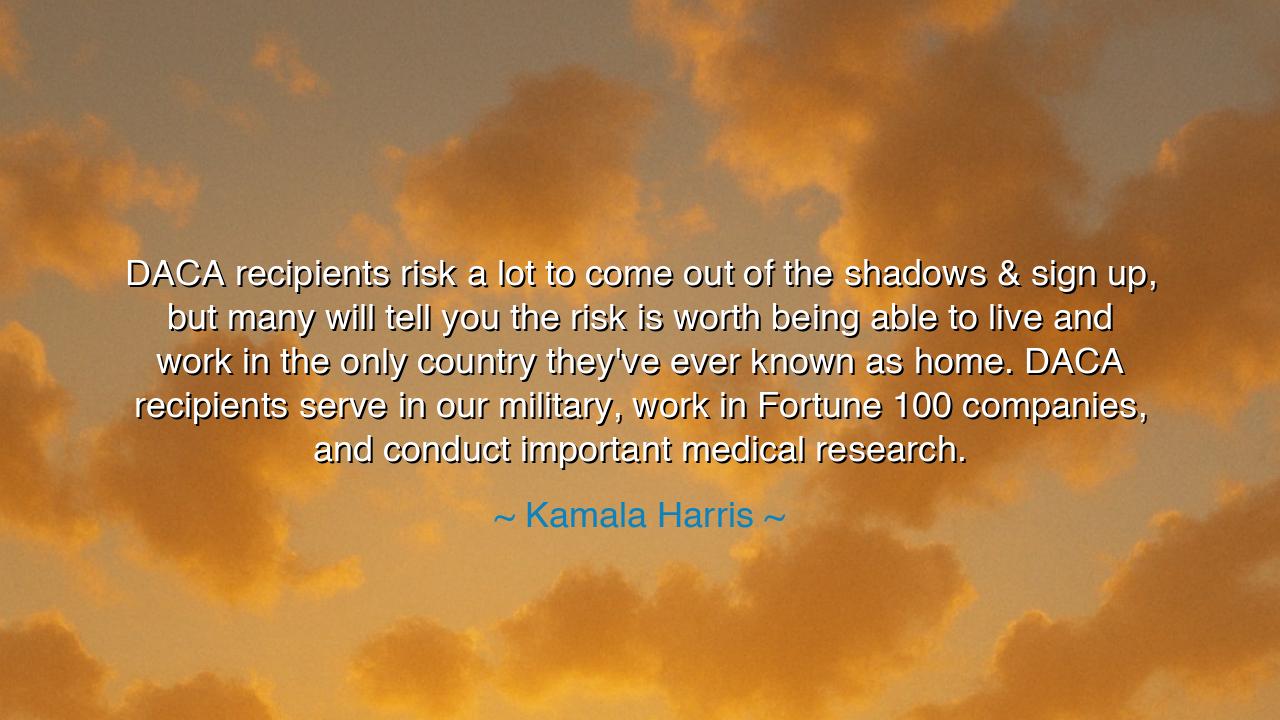
DACA recipients risk a lot to come out of the shadows & sign up
DACA recipients risk a lot to come out of the shadows & sign up, but many will tell you the risk is worth being able to live and work in the only country they've ever known as home. DACA recipients serve in our military, work in Fortune 100 companies, and conduct important medical research.






The words of Kamala Harris — “DACA recipients risk a lot to come out of the shadows & sign up, but many will tell you the risk is worth being able to live and work in the only country they've ever known as home. DACA recipients serve in our military, work in Fortune 100 companies, and conduct important medical research.” — are not merely political speech; they are a testament to courage, belonging, and the unbreakable bond between human dignity and the pursuit of purpose. Beneath these words lies a truth known since the earliest days of civilization: that home is not only a place one is born, but a land one serves, builds, and loves — often at great personal cost.
To “come out of the shadows” is to reclaim one’s right to exist in the light — to stand not as an unseen figure, but as a full member of the human community. The ancients spoke often of shadow and light as symbols of fear and truth. To live in shadow is to hide from the laws and judgments of others, to conceal one’s potential and pain alike. But to step into the light, even when the world’s gaze is harsh, is an act of immense bravery. DACA recipients, in doing so, mirror the journeys of countless heroes throughout history who risked safety for the promise of dignity. Their courage does not only honor themselves; it strengthens the very soul of the nation they call home.
These words remind us that America, in its truest spirit, has always been a land of promise — not given, but earned through faith, labor, and contribution. The Dreamers, as they are called, embody this promise. They were raised beneath the same skies, spoke the same language, pledged the same flag — yet their place was questioned by law and circumstance. And still, they rose. They learned, they worked, they served. Some donned the uniform of the military, risking their lives for a country that had not yet fully accepted them. Others built careers in Fortune 100 companies, shaping the very economy that sustains the nation. Still others pursued medical research, striving to heal the sick and advance the frontiers of knowledge. Through their actions, they proved what the ancients taught: that belonging is not granted by decree, but demonstrated through service and sacrifice.
Consider the story of Pericles’ Athens, where citizenship was prized above all else — yet it was not birth alone that made one worthy of it. It was participation in the life of the city, contribution to its defense, and loyalty to its ideals. The DACA recipients, though often denied formal citizenship, have lived this same ancient creed. They embody civitas — the devotion to community that transcends paper and title. Their story recalls that of the Roman freedmen, who, once bound by chains, later became teachers, architects, and soldiers, proving that freedom, once embraced, can turn oppression into greatness. So too do the Dreamers turn fear into fortitude, uncertainty into strength.
In Harris’s words, we hear not only advocacy but admiration — an acknowledgment that the spirit of a nation is measured not by its wealth or might, but by its capacity for inclusion. To welcome those who have already given much is not charity; it is justice. The ancients called this virtue xenia — the sacred duty of hospitality. A people who forget this duty risk their moral decay, for the walls that keep others out eventually imprison the builders themselves. When Harris praises those who “live and work in the only country they’ve ever known as home,” she invokes the timeless ideal that home is not a matter of birthright, but of love, loyalty, and labor.
The lesson is as eternal as it is urgent: the measure of a nation’s greatness lies in how it treats the brave souls who choose it, not merely those born to it. Every society, from the city-states of old to the nations of today, has been built by those who came seeking light — those who risked their comfort, crossed unknown borders, and dared to begin anew. To honor them is to honor the very act of creation itself, for civilization is nothing more than the gathering of wanderers who choose to build together rather than alone.
And so, let those who hear these words remember: greatness requires empathy, and freedom demands courage. We must never forget those who step from the shadows, for in their faces we see our ancestors, and in their dreams we glimpse our own. The call of this quote is clear — to stand beside those who risk everything for the chance to belong, and to ensure that their labor, service, and love do not go unseen. For when we lift those who dwell in the shadow into the light, we do not only redeem them — we redeem ourselves, and strengthen the foundations of the home we all share.






AAdministratorAdministrator
Welcome, honored guests. Please leave a comment, we will respond soon